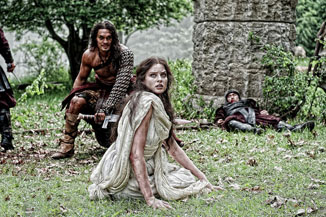|
|
Book vs. MovieConan the BarbarianBy Russ BickerstaffAugust 24, 2011
It’s kind of a brutal world that Howard is outlining here, but it is not without its beauty. Towards his later years, we see Conan as a patron of the arts - a man who understands that his conquests don’t amount to much and a man who has honestly come to appreciate the virtues of civilization. Jumping around as Howard’s narrative does, we never get a clear picture of the hero’s life from beginning to end. It’s all a bit muddled, but it reflects the irreverence for artificial narrative order that befits an uncivilized hero, which is actually really cool if you think about it. Beyond the more intellectual appeal of the series, there’s a kind of a world-weary sense of adventure about those early Conan stories that made them really compelling. Conan was seen in frozen tundra, chaotic wilderness battlefields and dizzyingly complex ancient cities, both living and long dead. In a remarkably concise span of words, Howard managed what most other fantasy authors have difficulty producing in volume after volume of so many long-winded, long-running fantasy novel series. The likes of Tolkien, Lewis, Brooks, Norton and so on all have sizeable followings, but it took them quite a long time to come to a point. (It is likely that Conan would’ve hated those stories.) In short, crisp prose, Howard created a beautifully sweeping saga that leaves plenty of room for the imagination to roam without the grotesque need to over-render things that seems to afflict so many fantasy authors.
[ View other Book vs. Movie columns ]
[ View other columns by Russ Bickerstaff ]
[ Email this column ]
|

|
|
|

|
Sunday, April 28, 2024
© 2024 Box Office Prophets, a division of One Of Us, Inc.


